home | metro santa cruz index | features | santa cruz | feature story
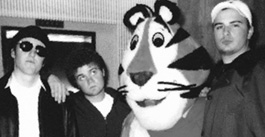
Team Young America: (Left to right) 'Big Time' Gene O'Neill, 'Boy Detective' Jordan Morris and 'America's Radio Sweetheart' Jesse Thorn network with Tony the Tiger
My Life As America's Radio Sweetheart
On the cusp of his move to KUSP, 'The Sound of Young America''s dearly beloved radio host reveals all
By Jesse Thorn
The Intro
I was born in 1981. In 1982, I began composing my memoirs, with the able assistance of Presidential Historian, Pulitzer Prize Winner and Accused Plagiarist Doris Kearns Goodwin. Today, nearly a quarter-century later, I've created a 12,000-page tome that I think sums up the first 25 years of my amazing and inspiring life. I hope the book, when it appears, will help historians of the future understand my impact upon not only our nation but upon our world.
I'm currently in talks with a number of (largely imagined) publishers, but in the meantime, I thought I'd share a few excerpts from the larger text, which focus on my time in my adopted hometown of Santa Cruz. I expect these entertaining tales will cement my legacy as a Great Santa Cruzan, alongside other legendary locals like the guy from Survivor and the guy that decided to put a fiberglass caveman on the sky-tram at the Boardwalk.
How I Ended Up in Santa Cruz
Here is a (partial) list of colleges and universities that saw fit to reject me:
Yale
Harvard
Penn
Wesleyan
Amherst
UC-Berkeley
Oberlin
Reed
Please note that some have been lost in my spotty memories of this traumatic time in my life. During the months of January--April of my senior year of high school, I was only able to avoid suicide by keeping myself busy, building an addition to my parents' house out of carefully folded rejection letters and white glue.
Here is a complete list of colleges and universities which accepted me:
UC-Santa Cruz
DeVry (projected)
Did you know that the state cannot, constitutionally speaking, execute a severely mentally handicapped murderer because that person cannot understand the fundamental differences between good and evil? Let it be known, though, that DeVry will happily teach that same retarded killer the skills necessary for a rewarding career in Air Conditioner Maintenance. Also: Barbazon is ready and willing to make that enfeebled assassin a model (or at least make him look like one). Which if you think about it is really a pretty tall task.
My point being that it'd be unfair to say I didn't have any options. But I wasn't exactly flush with them, either. I had a carefully considered reasoning when it came to applying for, and eventually attending UC-Santa Cruz.
I know what you're thinking: "Jesse, you attended school in San Francisco, one of our nation's richest cities. Didn't you have a fleet of counselors to help you make these decisions? Your rationale seems a bit shaky."
There was a college counselor at my high-school, albeit part-time. We'll call him Gordy, not only because it's really his first name, but also because if he ever saw this, it might embarrass him a little. I know it would embarrass me.
In his capacity as College Counselor, Gordy did a grand total of two things.
The first thing was to help the students with exceptional talent (it was an arts school, like in Fame) get into Juilliard. A fair number of students did get into Julliard every year, but I think that probably had more to do with their talent than with Gordy's counseling.
The second thing Gordy did was to encourage everyone else, including me (Student Body President, honor roll, president of five (5) clubs, all-around good guy), to remember to apply to City College on time.
In his office was basically a stack of applications for Julliard, and a stack of applications for City College, and he more-or-less just pointed you toward one or the other. If you mentioned that maybe, just maybe, you'd like to attend a four-year academic institution, he'd say something like, "Well, have you considered Sonoma State?"
What I'm saying is that he was less than helpful.
And my parents? I guess my parents figured I could sort of sort it out myself.
Put those ingredients in a pot and stir, and all of a sudden, I'm moving to Santa Cruz.
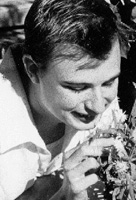
The Arrival: A young and innocent Jesse on his first day at UCSC
My first week at Santa Cruz
If anyone ever asks you, "Is it possible for a grown man to be afraid of trees?," feel comfortable replying in the affirmative. If they don't believe you, just have them get in touch with me, via my website, maximumfun.org.
Let me say that I grew up in the 'hood. People started trying to sell me crack when I was 10. A junkie broke into my house and threatened my mother with a knife when I was about 8. I got jumped on several occasions. I'm not exactly Ice Cube, but I'm not afraid of walking around.
And yet, when I came to UC-Santa Cruz, I was deathly afraid of the trees. The big, green, creepy trees.
Not afraid like they were going to eat me. Afraid like, "What are these fuckers up to?" Because let's be honest, trees spend their time LURKING and BEING CREEPY.
Hmm, guess I never quite got over that.
Drugs Part 1
Unlike many Santa Cruzans, I have never used drugs. Partly due to my contrarian streak, partly because my parents did them all and there aren't any left. Once in a while, a bizarre story will come out--the time my mom was arrested for bank robbery and LSD trafficking (only the latter was actually true); the time her friend climbed Washington's RKO tower, thinking he was a giant ape. My parents lives were essentially a real-life version of a '70s after-school special. You may laugh at a young Helen Hunt taking PCP, screaming and leaping through a fourth-floor window. My parents lived it.
Once, on my way to Santa Cruz from San Francisco, my dad told me the story that takes the cake.
Somewhere around San Jose, driving south on 280, my dad turned to me. "Hey, whatever happened to Sly Stone, anyway? Is he dead?" Sly (and his Family) were performing "If You Want Me to Stay" on the tape deck.
Having just completed a course at San Francisco State called "History of the Funk" (really), I actually knew the answer. "He's alive, but he's a recluse. He hasn't appeared in public in years. Some people say he's basically a vegetable."
"From the drugs, or what?"
"I think because of the drugs he takes to control the craziness from the drugs he took."
(My dad nods calmly, eyes on the road, processing this information.)
He looks over again: "Did I ever tell you about my drug-induced psychosis?"
If I can pause for a minute and clarify that he said this in the manner a normal person would say something normal. The tone was sort of like, "Did I ever tell you about the time I saw Macaulay Culkin at the water park?" or maybe, "Did I ever tell you about the time I rolled a Yahtzee, and then rolled another Yahtzee, but I had to use the second Yahtzee as a chance because I had already used my Yahtzee when I rolled the first Yahtzee?"
I played it cool, teenager-style.
"Uhm, no."
Then he told me this amazing story.
In the early '70s, he lived on the Big Island of Hawaii. I'm not entirely sure what he did there, but I imagine his life as being kind of like The Dude in The Big Lebowski. A lot of morning-drinking, aimless wandering and casual footwear.
So one day, he makes himself a mushroom omelette, and gets the great idea that instead of standard mushrooms, or even portobello mushrooms, he will use psychedelic mushrooms. Apparently, this worked out pretty well, because he went on to do it every day for a week. In fact, as far as I can tell, the only thing that stopped him from doing it indefinitely is that after doing it for a week, he was pretty much incapable of discerning the difference between a frying pan and, say, a dog.
At some point on the seventh day, he wandered out onto the beach, naked, and fell into a six-foot deep hole in a volcanic rock. He was chest deep in seawater, and he had a vision.
In this vision he was confronted by a group of 12 huge men, representing every race in the world. Each was about 12 feet high. He realized, magically, that these men knew that they were judges, sent to decide whether he would live or die.
In the court of life-or-death, my father represented himself. And he won. After what seemed like hours presenting his case, the 12 huge men of every nation decided that my dad had something to live for, and let him go.
That is when the Hawaiians got hold of him.
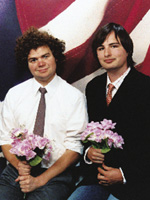
Young Americans: Jordan and Jesse visit the Sears Portrait Studio.
In the early '70s, as now, the native people of Hawaii were not crazy about white people, particularly naked hippies on their beach. So they pulled him out of the hole, and started beating him up. My dad was pretty fresh out of the Navy, and tough, and beat them off, running into the waves to escape them. The Hawaiian guys didn't want to get wet, so they started throwing rocks at my dad, trying to brain him.
"No problem," my dad's mushroom-addled mind thinks, "I'll catch the rocks." Notice he did not think, "I'll dodge the rocks" or "I'll swim to safety," but rather, "I'll catch the rocks." After a while, the Hawaiian guys got tired of throwing rocks at him.
"Hey, white guy," they shouted.
"Yeah?" my dad replied.
"Hey, we're tired of throwing rocks at you. We won't do it anymore, why don't you come back here and we'll be friends."
"OK."
So my dad came back to the beach, where the Hawaiian guys started beating him up again.
Which is where the story gets amazing, because not only did my dad beat them off again, but the whole thing happened again. Twice. This horrible cycle of beating-escape-waves-rockcatching-deception happened THREE TIMES. It was only ended by an old Hawaiian lady, who scared everyone off with a shotgun full of salt.
Anyway, he ended up walking down a highway naked for a few days, then going to the psychiatric jail hospital for six months. The end.
And then when he finished telling me this story, he laughed a little. Honestly, I wasn't really sure what to do.
Drugs Part 2
Recently, I was talking with the former co-host of The Sound of Young America, "Big Time" Gene O'Neill. We were chatting about our first year of college--we became friends in Porter College core class, a class everyone is required to take, and no one is allowed to fail. We bonded, initially, over Norm MacDonald. Both of us thought he was a Great Genius, an opinion that was only slightly less unpopular then than it is now.
"Man, Jesse," said Gene, "I swear to God I thought you were on drugs the entire time we were in core class. Seriously, I thought you were high the entire time."
Now, I wouldn't call Gene a heavy-duty drug user, but this is a man who once went without sleep for nearly 48 hours just "to see what would happen." He would seem to be familiar with the effects of drugs, and how they might manifest in, say, 18-year-old me.
Was I really that wierd? Am I really that weird? Does my behavior suggest to strangers constant intoxication? Was it just that if you were to point to any given UC-Santa Cruz student, and bet $20 at even odds that the student was high, you'd have the smart money?
Gene clarified. "Jesse, there were what, 20 people in our core class? You were the only one I thought this about. Like of all the people at UCSC, you were the most overwhelming candidate for usage."
I asked him why he had this opinion of me, and he reminded me of two projects in class. The first I didn't remember at all. It was a project on Art Spiegelman's Pulitzer Prize--winning holocaust comic Maus which apparently included both a German accent and references to LL Cool J. The second was my "core project."
Core class required, for a final project, that we interpret an artwork through some other art form. In a fit of characteristic laziness, I had avoided writing or creating anything, instead choosing to perform a comic monologue I'd written in high school. The monologue related the true-to-life story of the time my dad stepped on my hamster in the middle of the night, then kept it secret from me for a week. I think it was supposed to relate to Maus or something. I'm sure if I saw myself doing this monologue today, I would be mortified, but for a thing an 18-year-old thought of, it was fine.
Here's the catch, though: I thought it needed a little "juicing up" to make it Art. So I decided that over the course of the monologue, I would take my clothes off, one piece at a time, and hand them to audience members. I chose not to justify this, thinking it was sort of an Andy-Kaufmanesque performance piece. I did not show my wiener.
That said, wiener or no wiener, it was a pretty ridiculous thing to do. I'm not entirely sure how I did it. Or why. But after thinking about it for a while, I understood what Gene was saying about the drugs.
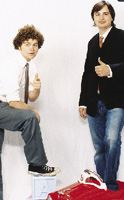
Totally Awesome: 'Sound of Young America' hosts are also available for motivational speaking seminars.
The People of College and Community Radio
God bless college and community radio. My show, The Sound of Young America, wouldn't exist without Santa Cruz's own KZSC, where we began six years ago. It's one of my favorite places in the world, and I nearly cried when I left. That said, like all college and community radio stations (and I've spent time around a few), it is patently ridiculous.
Here are some people you will find at your local college or community radio station:
Arrogant 19-year-old: These people are largely young men who wash their hair with bar soap. Their core value is that they alone should define the playlist of not just their show, or their station, but of all world media. Ask them about commercial radio. I dare you. Their profanity laced tirade will belie the fact that only two years previous they were completely happy listening to Green Day on KROQ. That was before they discovered (Pick One: The Smiths, Black Flag, Slayer, Squarepusher, Radiohead, Hieroglyphics, Belle & Sebastian, the Clash, Son House, John Coltrane, Rachmaninov). Now they're better people, and you will be too, because you will/must like EXACTLY THE SAME RECORDS THEY DO.
Most remarkable about these folks is that they feel that only their unique blend of (Pick any four: Ska, Hardcore, Old-School Hip-Hop, Glam, Jungle, Death Metal, Ironic '80s pop, No Wave, Free Jazz, Hippie Crap, Old-Timey, Industrial, Leonard Cohen (not technically a genre, played as though it were one), Latin Jazz) is TRULY representative of free-form radio, or of the people's tastes. If you dare to suggest that they stick to one genre, or even incorporate more of something they're not that familiar with (being 19), you have made a horrible mistake. RUN.
In these boy's minds, any number of bizarre theories are Undoubtedly True and Conclusively Proven. These include:
"(Hip-hop, jazz, rock) is dead."
"You listen to rap, I listen to hip-hop."
"Che lives on through the music of (Rage Against the Machine, the Coup, Spearhead, Rachmaninov)." "Popular music (ended, started) in 1970."
"It is acceptable to casually refer to Bob Marley as 'Bob.'"
Some other facts about these people:
They find talking on-air to their friends (who are high) hilarious. They are alone in this opinion.
They "forgot" to play the clean version of that 2 Live Crew CD. Luckily for the station, no one will complain to the FCC, because in order for someone to complain, someone would have to be listening in the first place.
Their mother still buys their underwear. In a bag. At Target.
Awareness Raiser: These friendly and sincere young women are deeply committed to Awareness Raising on the vital issue of (Pick One: AIDS, gender identity, their vague familiarity with the word "hegemony," a particular foreign country, hemp, fluoridated drinking water, shoelessness, the dangers of psychiatry, the fact that despite their privilege they are nonetheless good persons). They cling tightly to a heartfelt belief that if they raise enough awareness, eventually, many years from now, it may be time to do something.
They see radio as a perfect medium for this quest. Their only disappointment is that the full impact of their giant, terrifying papier-mâché Ralph Nader head is lost on an audience who cannot see it.
Reggae Guys: Sometimes these white guys with dreadlocks talk in a faux-patois. This is both bizarre and kind of impressive. They are pretty nice, and mostly interested in moving to Jamaica, where they will likely be shot.
Once they got a dub plate from (Beenie Man, Elephant Man, a homeless guy with a Jamaican accent) and they are really inordinately proud of it.
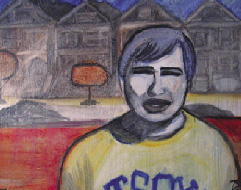
The Fan of Young America: Portrait of Jesse by a loyal listener
Aging Hippies (Friendly): These people love "roots" music, a genre known to the rest of the world as "why did I buy the O Brother Where Art Thou? soundtrack again?" Luckily, they are really nice and like to help young people. A lot of times, they bring their dog, which is against the rules, but the dog is so nice you can't really hold it against them. They have a lot to teach the next generation, particularly about the Austin Lounge Lizards.
These aging hippies are also vital to the operation of the station, because as their contemporaries have grown older, they have also gotten much richer and much guiltier about their increasing richness. They assuage this guilt by giving money to public radio stations, and specifically to the shows hosted by other aging, increasing guilty hippies. This aging/richness/guiltiness process is to public radio as photosynthesis is to leafy plants.
Aging Hippies (Embittered): One of these aging hippies called in to my show once, during a song break, and said, "This show represents everything that's wrong with KZSC." Again, just to clarify, this was RIGHT IN THE MIDDLE OF THE SHOW.
I have never forgotten this horrible trauma, and the rage it begat powers my drive to conquer all of public radio.
Student Station Manager: The key to the operation of a public radio station is generating one student per year who is responsible. They needn't be brilliant, though it helps. They needn't be personable, though it helps. They just have to show up, run the station and go home. Every year, the old station manager graduates, and the people of the station band together to sweet-talk the one responsible person in their midst into "running" for the position. This is a bit like "running" for the position of head janitor at Grand Central Station.
Long-Suffering Faculty Member: When Kofi Annan retires from the U.N., they should start the executive search at a community radio station. If you're wondering what could possibly hold these stations together, it is the improbably patient, underpaid political geniuses called "Faculty Advisors" who are the glue. A college station usually gets one, they're often the only regular paid employee and the buck stops with them. These people amaze me.
Aspiring Public Radio Producers: This is a category of young people who come to college and community radio for an education. They actually aspire to a career in public radio.
What they learn is not so simple as how to operate a sound board, or how to edit audio.
They learn that a tight-knit cabal of latte-drinking, Saab-driving, Japanese-restaurant-eating East Coast intellectuals named Terry Gross controls public radio.
That's right: Terry Gross controls all of public radio. Turn on NPR right now--the voice you're hearing? Terry Gross. EVEN IF IT CLAIMS TO BE SOMEONE ELSE.
Scott Simon? Actually just Terry Gross talking into one of those "Talkman" tape recorders from Home Alone 2.
Tom & Ray from Car Talk? Terry Gross + Talkman + Recording of maniacal laughter.
Ira Glass? Terry Gross + Talkman + liberal use of the word "uhm."
Sylvia Poggioli? Terry Gross doing a voice she learned from watching Olive Garden commercials.
Until a few years ago, Morning Edition's Bob Edwards was the sole exception to this all-Terry-Gross rule, and look what happened--he got fired. When he left, he was told in no uncertain terms that if he revealed the secret, Terry Gross would hunt him down, and Terry Gross would execute him. Gangland style.
Ms. Gross even uses a system of levers and pulleys to single-handedly operate member stations across the country. Thanks to the miracles of radio station automation, the sole actual paid employee of public radio, nationwide, is Terry Gross.
Upon learning all of this, Aspiring Public Radio Producers typically consider quitting public radio, then start writing snarky features for local alt-weeklies.
The Time I Saved a Bunny
The night before I graduated from college, my friend Jim and I were pulling into my driveway in the Beach Flats in my El Camino, when we espied a bunny rabbit. To be clear: this was not the kind of bunny you shoot with your BB gun, mind you, this was the kind of bunny you feed alfalfa and name "Hopsy."
I am fat and stiff, but Jim is bouncy and spry, and with his help we cornered the bunny, and I picked it up by the scruff of its neck. At that point I realized that our plan was a bit ill-considered--now that we had captured this bunny, what would we do with it? We ended up dropping it in a refrigerator box, and giving it a carrot. Bunnies love that shit.
I was moving out the next day, so I put a big sign outside that said, "BUNNY FOUND/CONEJO ENCONTRADO." I made it with a piece of cardboard and a big fat marker, and taped it to my mailbox.
The next day, a train of tiny children appeared at my door, each smaller than the next. The largest, who was about 8, and was about the size of a 20-ounce bottle of Coke, rang the bell. The others, each about the size of a salt shaker, hid behind him. When I answered the door, he looked at the ground and muttered with a gentle accent, "Did you find a bunny?"
I told him I had.
"Could I see it because I think it is my cousin's bunny, but I'm not sure I have to see it."
I showed him the bunny, which was still in the box.
"Lemme go talk to my cousin."
The train of children left, each holding onto the clothes of the one directly in front of him or her. Ten minutes later, they returned.
"That's the bunny." A little clearer now.
And all these little children gathered around the box, each grabbing a little piece of the flap, and they picked it up and carried it off down the street.
This was, more than likely, the best single event I have ever been a part of. Without any means of topping it, I moved back to San Francisco.
The Outro
I hope you have enjoyed the story of my life in Santa Cruz, astonishingly abridged. Upon the advice of Ms. Kearns Goodwin, I have borrowed much of the text from Hank Searl's 1969 book The Lost Prince: Young Joe, the Forgotten Kennedy, and from Rose Kennedy's 1974 autobiography, Times to Remember.
I'm so excited to be back on air in Santa Cruz, "The City with Broad Shoulders." It's a wonderful place, and we're all luckily to live here (except me, I live in Los Angeles now).
Yours fondly and with utmost regard,
Jesse Thorn, "America's Radio Sweetheart"
Just What Is 'The Sound of Young America'?

The Sound of Young America is a public radio show about things that are awesome. I started the show six years ago, right here in Santa Cruz. My co-hosts were the two funniest people I'd met at UCSC, Gene O'Neill ("Big Time") and Jordan Morris ("Boy Detective"). Pretty soon, they were my best friends. Back then, it was a hodge-podge of interviews, comedy bits, pre-recorded audio and call-ins that could only exist on community radio. Today, it's streamlined--no more call-ins, only one host (Jordan and Gene work in TV now), more interviews--but the same spirit of Maximum Fun that informed the earliest incarnations of the show still informs it today.
The way I see it, public radio is a wonderful thing, but it has a monolithic culture that results in quite a few blind spots. Singer/songwriter Lucinda Williams and rapper Devin the Dude are both wonderful, critically acclaimed musicians, but which of those two would you never hear on Weekend Edition? It's an easy answer.
Even when public radio does cover a topic like, say, rappers, does it do a good job? I'd hate to criticize the interviewing technique of, say, Steve Inskeep. That said, I'd also hate to see him bluff his way through an interview with Devin, who was one of my favorite guests on The Sound. On my show, you'll hear from amazing artists who are a bit outside the NPR mainstream, and I always give them the same treatment that Lucinda Williams would get elsewhere in public radio.
Part of the reason I can promise that kind of full engagement is that this is a show with a real point of view: mine. These days, The Sound is on a half-dozen stations and is one of the most popular podcasts in public radio, but I still produce it myself, with a microphone and a mixer in my living room. Honestly, I think that's part of why folks like it. Even if the guest is famous, I still think you can hear that it's basically hand-crafted radio, coming from me to you, and I'm proud of that.
The Sound of Young America left the airwaves of Santa Cruz six or so months ago with the promise that we'd be back someday, and thanks to the brave folks at KUSP-FM (88.9), that day is here. You can hear the show on KUSP every Sunday at 6pm, or you can listen for free online at www.maximumfun.org. Our podcast is free, too--search for "The Sound of Young America" in iTunes, or use the free software on our site. I'm excited about reconnecting with the great people of Santa Cruz and the Monterey Bay Area, and I hope you'll take a listen to the show.
Jesse Thorn
Send a letter to the editor about this story.
|
|
|
|
|
|